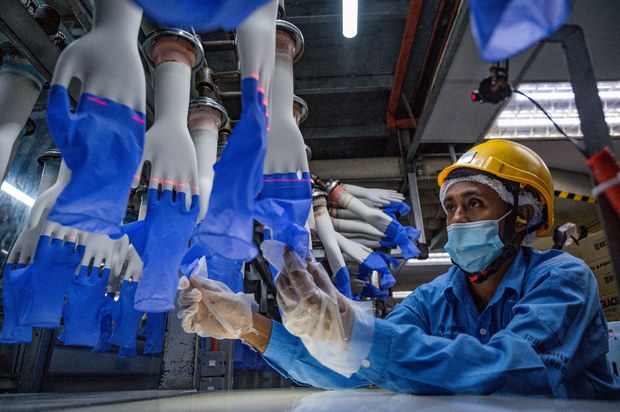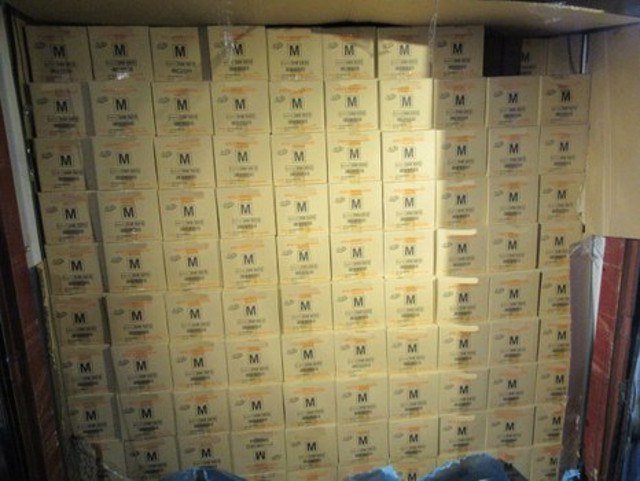Malaysia’s Top Glove: Working with US to Get Ban Lifted
2021.05.05
Kuala Lumpur
 An employee inspects disposable gloves manufactured at the Top Glove factory in Shah Alam, on the outskirts of Kuala Lumpur, Aug. 26.
An employee inspects disposable gloves manufactured at the Top Glove factory in Shah Alam, on the outskirts of Kuala Lumpur, Aug. 26.
Updated at 11:15 a.m. ET on 2021-05-06
Malaysia’s Top Glove said Wednesday it was working with U.S. Customs and Border Protection to lift a 2020 ban on its products, a day after the agency seized a shipment of 4 million medical gloves from the world’s largest manufacturer.
The company claimed a third party auditor had found that concerns behind the ban about forced labor had all been resolved, and said CBP was reviewing its report of this outcome.
“With reference to reports on Top Glove’s one container to Cleveland Port, Ohio, U.S.A., Top Glove wishes to inform that the Company continues to work closely with the U.S. CBP towards the expeditious resolution and revocation/modification of the Withhold Release Order (WRO)/Finding,” Top Glove said in a statement Wednesday.
The U.S. agency “is currently reviewing our submission on the back of the company having remediated the 11 International Labor Organization’s (ILO) forced labor indicators,” the firm said.
“The company’s resolution of the 11 ILO indicators of forced labor had earlier been verified by independent international U.K. consultant, Impactt Ltd, in its report dated 22 April 2021,” Top Glove added, referring to the U.N. agency’s list of practices that indicate coercive labor.
In Cleveland on Tuesday, CBP personnel seized a U.S. $518,000 shipment of 3.97 million nitrile disposable gloves, following a March order that these Top Glove products must be confiscated at American ports.
“This seizure sends a strong message that CBP will not tolerate imports made by forced labor, which is a form of modern slavery that hurts vulnerable workers and threatens our economy,” Diann Rodriguez, Cleveland’s area port director, said in a statement.
“CBP continues to facilitate the importation of legitimate PPE personal protective equipment] needed for the COVID-19 pandemic while ensuring that the PPE is authorized and safe for use.”
Last July, the U.S. CBP blocked imports of Top Gloves surgical gloves, saying it had evidence of multiple forced-labor indicators at the firm’s operations. They included “debt bondage, excessive overtime, retention of identification documents and abusive working and living conditions.”
After the block, Top Glove had submitted a petition requesting the CBP to modify its order – called a Withhold Release Order – CBP spokesman Nate Peeters said late on Wednesday.
The process of reviewing such a petition varies from case to case, and a block order would not be changed unless the CBP was satisfied that the company no longer used forced labor, he said.
“CBP will not modify or revoke a Forced Labor Finding until it has information that all indicators of forced labor identified by the agency have been fully remediated and it is demonstrated that forced labor is no longer being used to produce the goods targeted by the finding,” Peeters told BenarNews via email.
On March 9, the company had said that an independent consultant had “confirmed that there is no element of systemic forced labor in Top Glove.”
However, the statement issued at the time by Impactt said that Top Glove had made progress on, but not resolved six forced-labor indicators.
During a subsequent review carried out in last month, the British consultant firm said it found “that Top Glove had made further progress to close the 6 indicators of Forced labor Indicators remaining in January 2021.”

Malaysian firm Top Glove’s shipment of surgical gloves is seen after it was seized by the United States Department of Customs and Border Protection at the Port of Cleveland in Ohio. [Photo courtesy United States Department of Customs and Border Protection]
Andy Hall, a migrant workers’ rights expert, who has been a vocal critic of worker conditions at Top Glove but who has recently adopted a “critical friendly” approach to the company, said that the company had made strides in addressing forced labor issues.
“It is time to acknowledge positive momentum forward shown by Top Glove’s leadership to effectively seek to identify, remediate and prevent systemic forced labor indicators from being present in the company’s direct operations and supply chain,” Hall told BenarNews in a statement on Wednedsay.
Hall also questioned the U.S. customs agency’s “reluctance to withdraw the forced labor trade related finding.”
“[O]ther leading gloves companies in Malaysia are doing far less than Top Glove to ensure the welfare of their workers, yet they are still not similarly subject to CBP trade enforcement action and product seizures,” Hall said.
The Malaysian government, however, still believes Top Glove isn’t doing enough.
On March 16, the government charged Top Glove with failing to provide worker accommodations that meet minimum standards. The company pleaded not guilty to the 10 charges against it, but if convicted it could be fined up to RM 50,000 (U.S. $12,000) per charge.
The charges stemmed from numerous investigations into allegations of poor conditions at dormitories of six factories owned by Top Glove, after more than 3,400 workers tested positive for COVID-19 in its plants in Selangor state.
When the U.S. customs agency, in March, ordered that Top Glove’s surgical gloves be seized, the Malaysian company had said its representatives in the United States were “liaising with CBP’s representatives for sufficient information to meaningfully address the issuance of the recent finding.”
Adrian Pereira, an analyst from a rights group North South Initiative, said U.S. actions against forced labor in Malaysian companies had no effect on these firms. In addition to Top Glove, the U.S. last year also blocked imports of palm oil products from Malaysian companies Sime Darby and FGV Holdings Berhad.
“The Americans can confiscate or seize all they want. Malaysian laws and regulations contain a different check list of trafficking indicators, so the exercise does not result in institutional reforms which Malaysia urgently needs,” Pereira told BenarNews.
“As for Top Glove, the reforms taken internally are welcomed and we hope they are consistent with time and cut across the whole supply chain.”
CBP has said that goods produced by forced labor present significant risks for consumers, and corporate, government and military supply chains.
This report has been updated with comments from a U.S. Customs and Border Protection spokesman.







